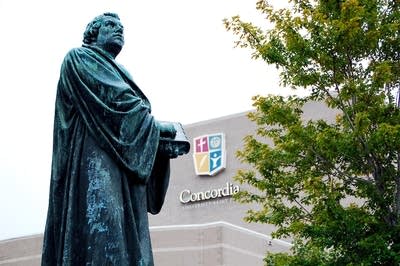Concordia University cuts annual tuition by $10K

After decades of college tuition costs that outpaced inflation across the country, an unusual announcement has come out of Concordia University. The private college in St. Paul is cutting its stated tuition price by a third, beginning next fall.
Dozens of private colleges across the country are trying similar cuts. Higher education experts say that could signal a change in how colleges set prices and disburse financial aid.
Look at the numbers and what Concordia University calls a "tuition reset" sounds significant. Annual tuition will drop by $10,000, to $19,700, said Rev. Tom Ries, Concordia president.
It doesn't take an economics major to know it's potentially a major change to the bottom lines of students and the university. But how can a small private college with 1,200 students afford such a move?
Create a More Connected Minnesota
MPR News is your trusted resource for the news you need. With your support, MPR News brings accessible, courageous journalism and authentic conversation to everyone - free of paywalls and barriers. Your gift makes a difference.
When the sticker price goes down, so does the amount of financial aid the college hands out. Almost no one pays full tuition. The net price that students actually pay varies depending on their family's income. Grants and scholarships halve the sticker price, on average.
While the change won't be a big one for student Jay Weiler, 20, from Auburndale, Wis., he said it amounts to a nice drop in tuition.
"I'm paying about $1,500 less than I would have been for next year," Weiler said.
There are other reasons the college can pull off the move. Undergraduates are the only students to get the tuition cut, and they make up just 40 percent of the college's revenue. Graduate students and some in non-traditional programs will continue to pay full price.
The college also hopes the lower cost will attract a few hundred more students in the coming years, bringing with them extra revenue that will make up for the reduced tuition.
College officials said the effort, three years in the making, carries moderate risk. If it does not result in increased enrollment, the college would be out about $700,000.
The move is driven in part because of the outcry over the rising cost of tuition at public and private colleges nationwide. Concordia officials say they've come to the realization that they just don't need to charge as much for tuition.
Some leaders at private colleges fear that if they don't charge as much as their competition, they run the risk of being seen as lower quality. But that view is changing, said Eric LaMott, Concordia's senior vice president and chief of operations.
"Now that has eroded mostly because of the cost structure," LaMott said. "This high tuition, high discount ... that is not a sustainable effort because there is such a big gap there anyway."
That high tuition/high aid approach faces increasing skepticism.
Lynn O'Shaughnessy, a San Diego-based author who writes the blog "The College Solution," thinks more colleges should drop the inflated sticker prices that few students actually pay.
"Maybe finally the time has come when colleges and universities are going to be honest about their prices," O'Shaughnessy said.
In the last two years, dozens of private colleges across the country have cut or frozen their tuition in an effort to become, or at least appear, more affordable.
It's a trend other colleges can be expected to follow depending on the market forces in their areas, their endowment levels and the financial needs of their students, said Tony Pals, communications director for the Washington, D.C.- based National Association of Independent Colleges and Universities.
"We will see more tuition cuts, but it's not an approach that will work for every institution," Pals said.
Concordia University officials say they expect at least some private colleges in Minnesota will follow their lead. The Minnesota Private College Council says it's up to each of its member schools to make their own decisions on the price of tuition.
Meanwhile, the state Office of Higher Education said it would like to see all Minnesota colleges do their best to provide more accurate numbers on the price of tuition so that it is easier for students and families to compare college costs.
